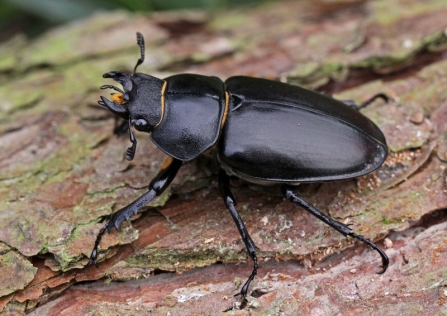A new report, Insect Declines and Why They Matter, commissioned by an alliance of Wildlife Trusts in the south west, concludes that drastic declines in insect numbers look set to have far-reaching consequences for both wildlife and people. The new report by invertebrate expert, Dave Goulson, Professor of Biology at the University of Sussex, highlights the severe effects of the declines on insect-eating birds, bats, and fish, and the cost to society due to lost revenue and broken ecosystems.
Professor Goulson, author of the report, says:
“Insects make up the bulk of known species on earth and are integral to the functioning of terrestrial and freshwater ecosystems, performing vital roles such as pollination, seed dispersal and nutrient cycling. They are also food for numerous larger animals, including birds, bats, fish, amphibians and lizards. If we don’t stop the decline of our insects there will be profound consequences for all life on earth.
“And it’s not just our wild bees and pollinators that are declining – these trends are mirrored across a great many of other invertebrate species. Of serious concern is the little we know about the fate of many of the more obscure invertebrates that are also crucial to healthy ecosystems.
“What we do know however is that the main causes of decline include habitat loss and fragmentation, and the overuse of pesticides. Wild insects are routinely exposed to complex cocktails of toxins which can cause either death or disorientation and weakened immune and digestive systems.”
The report concludes: “The consequences are clear; if insect declines are not halted, terrestrial and freshwater ecosystems will collapse, with profound consequences for human wellbeing.”
The Wildlife Trusts believe there needs to be a significant reduction in the use of pesticides, particularly the insecticides that are destroying the very creatures we depend on for the health of our natural world. Pesticides marketed as a quick-fix are creating a long-term ecological disaster but the damage they cause severely hampers The Wildlife Trusts’ ambition to create a Nature Recovery Network, which puts space for nature at the heart of our farming and planning systems – to bring nature into the places where people live their daily lives. To achieve this, wildlife and wild places need not only to be protected, but also restored and connected-up.
41% of insect species are ‘threatened with extinction’ globally
Gardens, parks, urban areas and farmed countryside need to be managed in a more insect-friendly way. This includes a major reduction in the amount, type, and frequency of pesticides used in the way we all manage and look after these places. Wildlife Trusts are working with like-minded organisations to do this and recognise that it will not be easy to make the transition from routine use, to routine avoidance of these harmful chemicals – whether at home in our gardens and allotments; in parks and other public green spaces including road verges; or on farms and woodland. Pesticide reduction could be achieved if the Government established stronger incentives for change and to set and enforce ambitious, national reduction targets for damaging pesticides.
The public are asked to show their support by pledging to take action for insects at home by reducing their own use of pesticides and to change their gardening habits to provide havens for insects and wildlife.
The report highlights the main reasons why our pollinators and other insects are dying:
Habitat loss. The report says:
“Over the last century, natural and semi-natural habitats have been cleared at an accelerating rate to make way for farming, roads, housing estates, factories, lorry parks, golf courses, shopping centres and a multitude of other human endeavours…[Today] many important insect populations [only] persist on small, highly fragmented and isolated islands of habitat.”
Pesticides. The report says:
“c.17,000 tons of poison [is] broadcast across the [UK’s] landscape each year.”
Much of this is associated with intensive farming, but the report also highlights the destructive capacity of domestic usage, where “numerous insecticides, fungicides and herbicides are freely available from garden centres, DIY stores and even supermarkets.”
Climate change. The report says:
“There is evidence that the ranges of some insects have begun to shift in response to climate…There is also evidence that the timing of emergence of some herbivorous and pollinating insects has become decoupled from that of their host plants.”
With three-quarters of human food crops dependent on pollination by insects, Prof Goulson states that “we could not feed the global human population without pollinators.”

